沈阳牛津 8B Chapter4-6
初中英语牛津版8BUnits4-6复习资料.docx
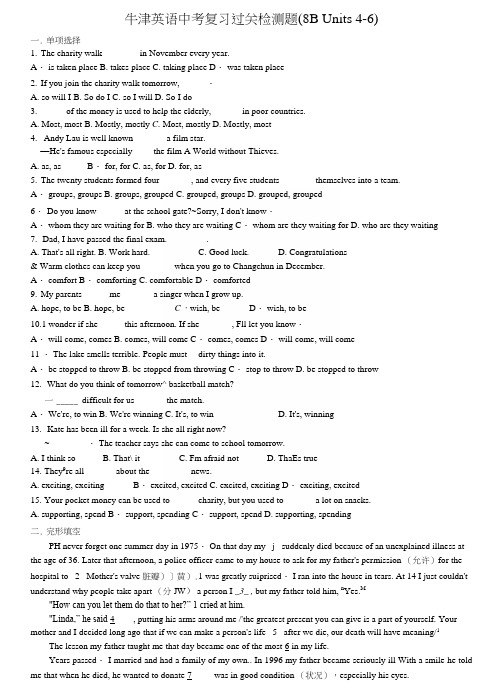
牛津英语中考复习过关检测题(8B Units 4-6)一.单项选择1.The charity walk _______ in November every year.A・ is taken place B. takes place C. taking place D・ was taken place2.If you join the charity walk tomorrow, _____ ・A. so will IB. So do IC. so I willD. So I do3._____ of the money is used to help the elderly, ______ in poor countries.A. Most, mostB. Mostly, mostlyC. Most, mostlyD. Mostly, most4.-Andy Lau is well known ______ a film star.—He's famous especially ___ the film A World without Thieves.A. as, as B・ for, for C. as, for D. for, as5.The twenty students formed four ______ , and every five students _______ themselves into a team.A・ groups, groups B. groups, grouped C. grouped, groups D. grouped, grouped6・-Do you know _____ at the school gate?~Sorry, I don't know・A・ whom they are waiting for B. who they are waiting C・ whom are they waiting for D. who are they waiting7. -Dad, I have passed the final exam.-- ______ .A. That's all right.B. Work hard.C. Good luck.D. Congratulations& Warm clothes can keep you _______ when you go to Changchun in December.A・ comfort B・ comforting C. comfortable D・ comforted9.My parents ______ m e ______ a singer when I grow up.A. hope, to beB. hope, be C・ wish, be D・ wish, to be10.1 wonder if she _____ this afternoon. If she ______ , Fll let you know・A・ will come, comes B. comes, will come C・ comes, comes D・ will come, will come11 ・ The lake smells terrible. People must _ dirty things into it.A・ be stopped to throw B. be stopped from throwing C・ stop to throw D. be stopped to throw12.-What do you think of tomorrow^ basketball match?一_____ difficult for us ______ the match.A・ Wc'rc, to win B. Wc'rc winning C. It's, to win D. It's, winning13.-Kate has been ill for a week. Is she all right now?~ ________ ・ The teacher says she can come to school tomorrow.A. I think soB. That\ itC. Fm afraid notD. ThaEs true14.They9re all ______ about the _________ n ews.A. exciting, exciting B・ excited, excited C. excited, exciting D・ exciting, excited15.Your pocket money can be used to _____ charity, but you used to ______ a lot on snacks.A. supporting, spend B・ support, spending C・ support, spend D. supporting, spending二.完形填空PH never forget one summer day in 1975・ On that day my _j_ suddenly died because of an unexplained illness at the age of 36. Later that afternoon, a police officer came to my house to ask for my father's permission (允许)for the hospital to _2_ Mother's valve 脏瓣)]黄).1 was greatly suiprised・ I ran into the house in tears. At 14 I just couldn't understand why people take apart (分JW) a person I _3_ , but my father told him, n Yes.M"How can you let them do that to her?” 1 cried at him."Linda,” he said 4 , putting his arms around me /'the greatest present you can give is a part of yourself. Your mother and I decided long ago that if wc can make a person's life _5_ after wc die, our death will have meaning/1 The lesson my father taught me that day became one of the most 6 in my life.Years passed・ I married and had a family of my own.. In 1996 my father became seriously ill With a smile he told me that when he died, he wanted to donate 7 was in good condition (状况),especially his eyes.My father died and we donated 8 as he had wanted・ Three days later, my daughter said, M Mum, I'm so _9 of what you did for Grandpa. H At that moment I realized that my father gave 10 his eyes. What he left behind sparkled(闪烁)in my daughters eyes・t1. A・ father B. mother C・ grandma D・ grandpa2. A. operate B. use C. make D・ repair3. A. loved B. lost C. forgot D. remembered4. A. quietly B. happily C・ angrily D. loudly5. A. worse B. poorer C. better D. more helpful6. A. wonderful B. important C. warm-hearted D. beautiful7・ A. however B. which C・ whoever D・ whatever8. A. his heart B. his eyes C. his life D. his ears9. A. afraid B. tired C. full D. proud10. A. much more than B. 1 ess than C・ many more than D. as much as三」阅读理解A doctor was once teaching a class of medical students at a famous hospital in Edinburgh・ An injured (受伤的)man was brought in, and the doctor turned to one of the students and asked him, H What r s wrong with this man?”H I don't know, sir,n the students answered. H Shall I examine him and find out?”M There r s no need to examine him/ said the doctor. H You should know without asking questions. He has hurt his right knee・ Didn't yon notice the way he walked? He hurt it by burning it in the fire. You see his trouser leg (初审脚)is burnt away at the knee. This is Monday morning・ Yesterday was fine, but on Saturday the roads were wet and muddy (泥泞的)・The man's trousers are muddy all over. The man fell down on Saturday night/1The doctor then turned to the man and said, "You had your wages(T资)on Saturday and went to a public house and drank too much. You got wet and muddy on the way home・ Because you had drunk too much, you fell on the fire and burnt your knee・ Is that right?M"Yes, sir, "said the man.1 ・ The medical students were having a lesson ______ ・A・ in a medical school B. at a well-known hospital C. in a classroom D. at the library2.The man hurt his knee _____ .A・ yesterday B. on Mon day morning C. on Saturday night D. on Friday night3.With his wages the man first went ____ ・A・ home B. to see the doctor C・ to see the friends D・ Io have a drink4.The man burnt his knee _____ •A. because he was illB. because he was coldC. because he was on his way home D・ because he had drunk too much and fell on the fire5.The doctor was good at ________ ・A. taking care of othersB. watching and thinking C・ learning from others D. teaching四.词汇A)根据句意及首字母提示,填入适当单词1." Help! Help!” She cried out in loud v______ .2.They are so weak that they can5t walk any f _______ ・3.Everyone was very generous and they had lots of support from local b _______ ・4.The money has already been donated to Project Hope for the poor children's e ______ ・5.Many volunteers do a lot of v _____ work for the Red Cross every year.B)根据句意,用扌舌号中所给单词的适当形式填空6.This charity show is ________ (support) by CCTV Station.7.It's ______ (harm) for us to stay in front of the computer for just a few minutes.& I felt very excited when the _______ (organize) chose me to be the host.9.The performers did very well in the show, we were satisfied with their _______ (perform).10.With the ________ (develop) of modern medicine, many difficult illness can be cured and prevented.五•根据中文意思完成句子1.有些人看不起残疾人是错谋的.It is _______________ some people _______________ disabled people.2.雪下得太大了,以致人们不能继续在外而干活.It snowed __________________ p eople couldn't __________________ o utside.3.他能够帮助如此多的人,我们感到很骄傲.Wc'rc _____________________ that he can ______________________ •4.因为天下雨,他们不得不呆在学校而放弃参加活动.They had to stay at school ____________________ taking part in the event _______________ the rainy weathe匚5.我认为这次慈善义演不很成功.I _______________ this charity show ___________________ ・六.选择方框中单词的适当形式补全句子。
牛津8B_Unit4
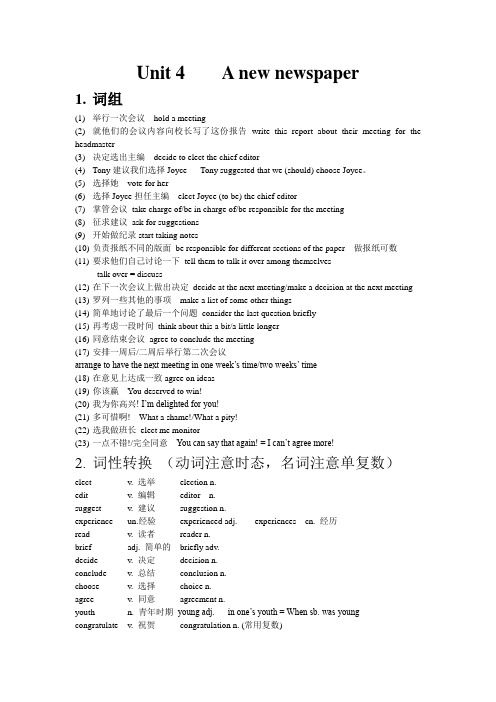
Unit 4 A new newspaper1. 词组(1) 举行一次会议hold a meeting(2) 就他们的会议内容向校长写了这份报告write this report about their meeting for the headmaster(3) 决定选出主编decide to elect the chief editor(4) Tony建议我们选择Joyce Tony suggested that we (should) choose Joyce。
(5) 选择她vote for her(6) 选择Joyce担任主编elect Joyce (to be) the chief editor(7) 掌管会议take charge of/be in charge of/be responsible for the meeting(8) 征求建议ask for suggestions(9) 开始做纪录start taking notes(10) 负责报纸不同的版面be responsible for different sections of the paper 做报纸可数(11) 要求他们自己讨论一下tell them to talk it over among themselvestalk over = discuss(12) 在下一次会议上做出决定decide at the next meeting/make a decision at the next meeting(13) 罗列一些其他的事项make a list of some other things(14) 简单地讨论了最后一个问题consider the last question briefly(15) 再考虑一段时间think about this a bit/a little longer(16) 同意结束会议agree to conclude the meeting(17) 安排一周后/二周后举行第二次会议arrange to have the next meeting in one week’s time/two weeks’ time(18) 在意见上达成一致agree on ideas(19) 你该赢You deserved to win!(20) 我为你高兴! I’m delighted for you!(21) 多可惜啊! What a shame!/What a pity!(22) 选我做班长elect me monitor(23) 一点不错!/完全同意You can say that again! = I can’t agree more!2. 词性转换(动词注意时态,名词注意单复数)elect v. 选举election n.edit v. 编辑editor n.suggest v. 建议suggestion n.experience un.经验experienced adj. experiences cn. 经历read v. 读者reader n.brief adj. 简单的briefly adv.decide v. 决定decision n.conclude v. 总结conclusion n.choose v. 选择choice n.agree v. 同意agreement n.youth n. 青年时期young adj. in one’s youth = When sb. was youngcongratulate v. 祝贺congratulation n. (常用复数)delight v. 使高兴delighted adj.design v. 设计designer n.different adj. 不同的difference n.3. 语法(1) the other, other, others, the others, another 区别①one…the other 表示(二者中)另一个的;Now open the / (your) other eye.好了,睁开你的另一只眼吧。
牛津英语8B__Chapter_4_reading

6. What is the speaker doing in the picture on page 49? He is looking around and watching what the others are doing.
Read and think
1.In what ways are speakers of the two poems similar?
Both of the speakers are young boys, and both poems are about the mood of the speaker‟s homes.
2. In what ways are they different?
In „Some Days‟, the speaker is very bored
3. The poem „Never a dull moment‟ is probably going to tell us that there is never a dull a moment in the poet‟s ______. a house b school c life d town
j uninteresting
Find the facts
MAY What‟s the name of the boy in the poem? RITA DK MAY How many people were there in the boy‟s house? RITA DK MAY How many things did the boy do ? RITA
2. Who lives in the house? Make a list of the family members. Eight characters live in the house: the speaker, his dad, mum, sister, brother, grandfather, the baby and the dog.
新牛津译林8BU4知识点

新牛津译林8BU4知识点Bu4知识点一、单词1、admonish: vt.警告,告诫老师警告我们要准时。
2、denigrate: vt.诋毁,中伤例句:He always denigrated other people's achievements.他总是诋毁别人的成就。
3、devoid: adj.空虚的,缺少的例句:His life has been devoid of happiness.他的生活已经缺少了快乐。
4、endorse: vt.赞同,认可例句:He endorsed the plan enthusiastically.他热心地赞同这个计划。
5、exert: vt.施加,发挥例句:Henry exerted himself to find a solution.Henry付出努力来找到解决办法。
6、garner: vt.收集,贮藏例句:He has garnered a lot of support.他获得了很多支持。
7、humility: n.谦卑,谦虚例句:She showed great humility when she apologized.在道歉时,她表现出很大的谦卑。
8、meticulous: adj.仔细的,一丝不苟的例句:She is a meticulous worker.9、oblivious: adj.不知道的,不留心的例句:He was oblivious to the danger he was in.他毫不留心自己所处的危险。
10、pivotal: adj.至关重要的,中心的例句:This issue is pivotal to the success of the project.这个问题对项目的成功至关重要。
二、短语11、be tied to: 与……有关联例句:This course is closely tied to our daily life.这门课程与我们的日常生活息息相关。
牛津英语8Bunit4grammar教案

牛津英语8Bunit4grammar教案Unit4&6period:Graar-.教学目标:l.Tounderstandthepurposeofusingconnectivesofreason .Touse“because”togiveareasonforsoething.Touse“becauseof”togiveareasonforsoething.Toshoresultsith“so”.Touse“hope”and“ish”correctl二.教学重难点:ords:groundPhrases:Sentences:Ricyhelpediththecharityshobecauseheantedtoraiseoney forProjectGreenHope..RicyasnervousbecauseoftheTVcaeras..ThereasalotoforsoIasverybusy..Ihopeyouillliethesho..Ihopetoseethecharitysho..IishIouldbethehostofthenextsho..Iishthepopstarsouldinviteetolunch.IishIcouldfly.IishIereRichy.0.Iishyouahappyholiday.1.eishyougoodluc.三.教学方法:Listeningandspeaing.四.教学手段-tape-recorderandulti-edia五.教学过程:Step1:Lead-inintroduceyselfI’ZhangPing,youcancalleissZhang.I’llteachyoutillyourteacher,isscai,ebacfrotheUSA.This isyfirsttietoteachfunithEnglish,soyouneedyourhelp,i fthereisanytrouble.Ididn’tteachforabouthalfayearbecauseIhadasonlastinter.Ilo veysonbecause板书heisverylovely.Iish板书Icouldstayathoe板书fororetie,butyourEnglishteacherhasgonetotheboard,so 板书Ihavetoebactoteachyou.Ihope板书ecangetellonith.freetalT:IlieF4becausethey’reveryhandsoe.hoisyourfavouritesportsstar/usicstar?S:…isyfavouritepopstar.T:hydoyouliehi/herbest?S:Because…Iliehi/herbecausehe/she…板书assoeorequestionsliethisStep2:pre-tas.l.Turntopage60.Let’sthinofRicy.Q1:hydidRicyhelpiththecharitysho?.Q2:hycouldn’tRicysleepthenightbeforethesho?.Step3:hile-tasTas1T:heneasforreasons,euse ‘hy’.henegivereasons,ecanuse ‘because’.T:underlinethesentencesthatcontaintheord ‘because’.Astostudentstoreadoutoneexapleeachfrothegraartablea tthetopofpage64.Explainthecontextoftheexercise.DanielisasingSandyab outthecharitysho.TheordsonthepiecesofpaperarereasonsfroSandy’snotes.AsstudentstoorontheirontoriteanserstoDaniel’snotes.Reindthethateachsentenceustcontaintheord‘because’.ReadouteachofDaniel’squestions.Asvolunteerstoanserthequestionsusing‘because’.Repeattheansersclearlyandasstudentstoch ectheironor.Tas2T:LooattheBb,esay:Ricyhelpediththecharityshobecauseheantedtoraiseoney forProjectHope.板书ealsocansay→Ricyhelpediththecharityshobecauseoftheoney.I’fatterthanbeforebecauseIhadababyfiveonthsago.板书ealsocansay→I’fatterthanbeforebecauseofybaby/hi.T:ecanalsouse‘becauseof’togiveareasonforsoething.heneuse‘becauseof’,itisfolloedbyanounorpronoun.T:Looatthegraartableatthetopofpage65.Shostudentstha tecanuse‘becauseof’toanserquestionsith‘hy’,e.g.hydidRicyhavetospealoudly?hyasRicynervous?T:ReadtheordsabovethespeechbubblesinpartB1,thefirst partsayshathappened,andthesecondpartisthereason.Ple aseuse‘becauseof’toaesentences.AsthreevolunteerstoreadouttheiransersT:partB2AyandShirleyarelooingatpicturesofaflood.Ayi sanseringShirley’squestionsaboutit.PleaseriteanserstoShirley’squestionsusing‘becauseof’or‘because’.SelecttostudentstoplaytherolesofShirleyandAy.Tas3T:IlieF4becausethey’rehandsoe.F4areveryhandsoe,soIliethe.Iliehi/herbecausehe/she…板书→He/Sheis…,soIliehi/her.Tellstudentsthatecanuse‘so’tointroducearesult.Readoutthetoexaplesandexplaintha tthefirstpartisafact,andthesecondpartisaresultoftha tfact.Explainthatlie‘because’,‘so’canbeusedtogiveareasonforsoething,buttheorderisdiff erentfroasentenceith‘because’.Inotherords,ecangivetheinforationinthee xaplesentencesusing‘because’asfollos:Iasverybusybecausethereasalotofor.IdonatedsoeoneybecauseIantedtohelpthepoor.AsstudentstorearrangetheordsinPartc1toaesentences.R eindthethatthefirstpartofthesentenceshouldbeafactan dthesecondpartshouldbearesult.oncestudentshavefinished,asthreestudentstoreadouton esentenceeach.correcterrorsandispronunciations.Asstudentstoreadthroughitty’sletterinpartc2foroveralleaningfirst.Thenasthetofil lintheblansusing‘because’‘becauseof’‘so’.Asstudentstoreadoutoneparagrapheach.clarifyanyisunderstandingsifnecessary.Asstudentstoplete‘orouttherule!’ontheiron.Asonestudenttoreadouttheruleandchectheans erasaclass.Inapoundsentence,ecannotusebecauseandsoatthesaetie.BecauseIgotuplate,soI’lateforschool.Igotuplate,soI’lateforschool.BecauseIgotplate,Ilateforschool.Tas4T:Iish板书Icouldstayathoefororetie,butyourEnglishteacherhasgo netotheboard,so板书Ihavetoebactoteachyou.Ihope板书Icangetellonithyou.TellSsthateuse‘hope’and‘ish’totalaboutthingsorsituationsthateanttohappen.Tohopeistoantsoethingtohappenandthinthatitispossibl e.eusuallyuse‘hope’totalaboutthepresentorthefuture.Toishistoanthatisnothappeningorhatdidnothappen.eusu allyuse‘ish’totalaboutthepastorthepresent.usageof‘hope’:vhope+todohope+clausen.hope→hopese.g.Ihopetoe.e.g.Ihopesheon’tetonight.e.g.you’reylasthope.usageof‘ish’:v.ish+todoish+sb.todoish+clause虚拟。
沈阳牛津英语8Bchpter 4

Chapter 4■I.词汇A.字母组词。
21. He _______ (jeectder) their offer of a job.22. It was _______ (rbeva) of you to help the child out in the burning building.23. A red lamp is often a danger _______ (lsangi).24. Just as we Chinese are _______ (dorup) of our history and culture, so are the Italians.25. He told a very ________ (veilly) story about his life in Africa.B. 根据句意和首字母提示,完成句子。
26. You shouldn’t k__________ thinking about that bad thing. Try to forget it.27. This is very important. We n______ more time to think it over.28. They brought the boat into the h_________ and prepared to head for Hong Kong.29. Although she was not rich, she was quite g___________ to her friends.30. This restaurant doesn’t have a l_____ to sell wine.■II.单项选择( )31. There is a smile ______ his face.A. atB. onC. inD. of( )32. We ______ his idea for a music club and decided to set up an art club instead.A. offeredB. agreedC. askedD. rejected( )33. Do you still have much work _______?A. doingB. to doC. doesD. do( )34. Could you speak ______ so that everyone can hear you?A. loudlyB. quicklyC. bravelyD. politely( )35. It’s not ________ to kick another player in a football game.A. importantB. politeC. fairD. interesting( )36. The man missed the bus. _____ was why he was late for the meeting.A. ThisB. ItC. ThatD. All( )37. It _____ me half an hour to get there yesterday.A. roseB. paidC. tookD. spent( )38. Please use _______ own eraser. Don’t use ______.A. your; herB. your; hersC. yours; herD. yours; hers( )39. —Why didn’t your father drive to work as usual?—Because his car _______.A. broke downB. will break downC. breaks downD. was broken down( )40. —Thank you for helping me with my English.—_________A. No, thanks.B. That’s all right.C. That’s a good idea.D. I’m bored.■III.语法根据汉语提示,完成句子。
牛津英语八年级下册8B Unit4全单元课件
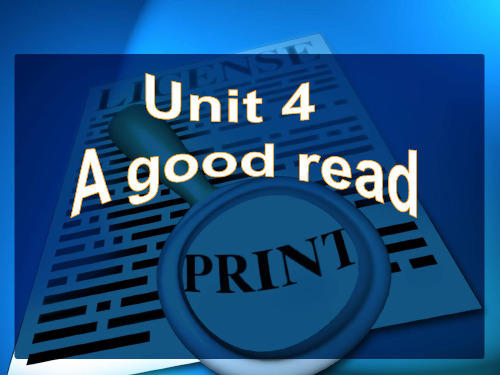
4. The story of the ugly man Quasimodo really touched me. 丑陋人卡西莫多的故事感动了我。 touch vt. 感动, 触动
e.g. 他的悲惨的故事深深打动了我们的心。
His sad story touched our hearts.
I. 请根据首字母写出单词的正确形式。
16. unable adj. 不能的,不会的 (反义词 able)
be able/ unable to do sth.
17. shoulder n. 肩膀
shoulders
Match the words on the left with the meanings on the right. (Part B1, P52)
1 against ___e___ a keep doing something
2 tired out ___d___
3 tie
___f___
4 tiny ___b___
5 continue ___a___
6 manage ___c___
b very small c finish what you have
1. Has Hobo decided what to do with the books? Not yet.
2. What does Eddie want to use the books to do? He wants to use them to reach the box on the fridge.
Read the conversation and answer the following questions: 1. What is Daniel reading? 2. Why does Daniel like reading history books? 3. What book does Sandy think is great?
牛津译林版英语8BUnit4Period6同步练习含答案.docx
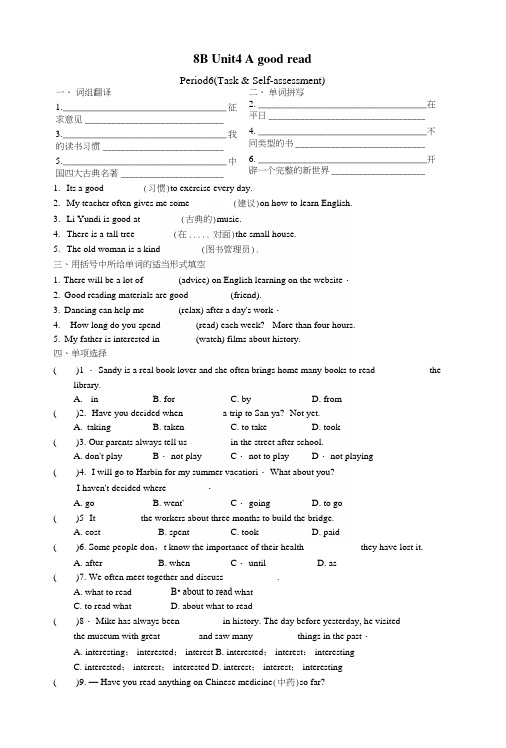
8B Unit4 A good read Period6(Task & Self-assessment)一、词组翻译1._______________________________ 征求意见_______________________________3._______________________________ 我的读书习惯___________________________5._______________________________ 中国四大古典名著_______________________ 二、单词拼写2. ________________________________在平日___________________________________4. ________________________________不同类型的书_____________________________6. ________________________________开辟一个完整的新世界_____________________1.Its a good _______ (习惯)to exercise every day.2.My teacher often gives me some ________ (建议)on how to learn English.3.Li Yundi is good at _______ (古典的)music.4.There is a tall tree ______ (在..... 对面)the small house.5.The old woman is a kind _______ (图书管理员).三、用括号中所给单词的适当形式填空1.There will be a lot of ______ (advice) on English learning on the website・2.Good reading materials are good ________ (friend).3.Dancing can help me ______ (relax) after a day's work・4.- How long do you spend _______ (read) each week? - More than four hours.5.My father is interested in _______ (watch) films about history.四、单项选择( )1 ・ Sandy is a real book lover and she often brings home many books to read ___________ the library.A.inB. forC. byD. from( )2. -Have you decided when _______ a trip to San ya? -Not yet.A.takingB. takenC. to takeD. took( )3. Our parents always tell us ________ in the street after school.A. don't play B・ not play C・ not to play D・ not playing( )4. -I will go to Harbin for my summer vacatiori・ What about you?-I haven't decided where ________ ・A. goB. went' C・ going D. to go( )5- It ________ the workers about three months to build the bridge.A. costB. spentC. tookD. paid( )6. Some people don,t know the importance of their health ___________ they have lost it.A. afterB. when C・ until D. as( )7. We often meet together and discuss ___________ .A. what to read B• about to read whatC. to read whatD. about what to read( )8・ Mike has always been ________ in history. The day before yesterday, he visited the museum with great _______ and saw many ________ things in the past・A. interesting; interested; interestB. interested; interest: interestingC. interested; interest; interestedD. interest; interest; interesting( )9. — Have you read anything on Chinese medicine(中药)so far?一・____ . but I will read it soon.A. Later onB. Not yet C・ Ever since D. Already have( )10•— Would you mind if I sit here? — _______ ・ It ,s for the old woman there. A ・ Never mind B ・ Of course not C ・ Not at allD. You ,d better not五、完形填空Do you like reading stories? Maybe you will answer, "No, I am not a child any more!" Yes, children all over the world always love stories.Chinese children are ____ J ___ in Monkey Kings story. It2— “ popular bedtime story inChina for many years. In fact, adults also love the story a lot. For then, Mon key King has become a very 3 part in the memory of their childhood ・ The clever and humorous money 4 the hearts of many Chinese people ・ British boys and girls all know Alice's Adventures in Wonderland well. As the name 5 it's a story full of dangerous but exciting trips. Children laugh, cry and even get frightened with Alice together while reading the story. Most American kids have read The Adventures of Tom Sawyer, by the famous writer, 6• Every one likes thebrave boy who also has lots of . Some scenes of the story may make your heart go faster,for Tom and his friends meet some very bad men and are usually・ Of course in the end,they beat the bad ones.You may also ask me 9 I like stories. Yes, I have liked them since I was very young. At that time, I often 」0 all my pocket money on story books ・ For me, stories are much more delicious than chocolate! They help me learn a lot. So either young or old, let 5s enjoy stories.How to become a better readerIf you wish to become a better reader, here are four important points to remember about speed ofreading:1. Knowing why you are reading-what you are reading to find out-will often help you to know whether to read quickly or slowly ・2・ Some things should be read slowly throughout. Examples are directions (指导)for making or doing something, Maths problems, science and history books, which are full of important information. You must read such things slowly to remember each important idea.3. Some things should be read quickly throughout. Examples are simple stories for enjoyment, letters from friends, news from local, or hometown, newspapers which tell what is happening to friends and neighbours ・4. In some of your readings, you must change your speed from fast to slow and from slow to fast as( )1. A. bored ( )2. A. can be ( )3. A. unhappy ( )4. A. beats( )5. A. spells B. interested B. was B. comfortable B. winsB. smells )6. A. Mark Twain B. Confucius ( )7. A. rules ( )& A. in danger ( )9. A. that ()10. A. paid六、阅读理解B. inventions B. in peace B. what B. tookC. worried C. has been C. forgettable C. hurts C ・ showsC. William Shakespeare C.ropes C. in silence C. why C ・ spentD. suiprised D. will be D. unforgettable D. breaks D. solves D. Charles Schulz D. risksD.in excellent condition D. if D. costyou go along. You need to read certain pages quickly and then slow down and do morecareful readings when you come to important ideas which must be remembered.( )1. According to the passage, your reading speed depends on ________ •A. whether the reading material is easy or difficultB・ what you are readingC.what your purpose in reading something isD.both B and C( )2. If one wants to be relaxed by reading, he should take up _________ .A.a stoiybookB.a book on science and technologyC.letters from friendsD.some material full of information( )3. Which of the following readings should you read slowly and carefully?A. Fairy tales.B. Aesopt Fables.C. Directions for use of a machine・D. An evening newspaper.( )4. Which of the following can best express the main idea of the passage?A.How to decide your reading speed.B.How to raise your reading speed.C.How to improve your reading skills.D.How to choose your reading material.七、书面表达目前,有许多中学生不重视课外阅读,请你根据下表内容写一篇短文,对这一现状进行分析并提出意见。
牛津译林版英语8BUnit4Grammar课件(1)

牛津译林版英语8B Unit4 Grammar课件一、教学内容本节课我们将学习牛津译林版英语8B Unit4 Grammar部分。
具体内容包括:现在完成时态的构成和用法,以及与之相关的语法知识点。
我们将详细探讨教材中第二章“Have you ever…?”部分的内容,以掌握现在完成时态在日常生活对话中的应用。
二、教学目标1. 学生能够理解并运用现在完成时态描述过去发生的、对现在有影响的动作或状态。
2. 学生能够在日常对话中熟练运用现在完成时态,提高口语表达能力。
3. 学生能够通过学习现在完成时态,培养英语思维,增强跨文化交际意识。
三、教学难点与重点1. 教学难点:现在完成时态的构成和用法,特别是与一般过去时的区别。
2. 教学重点:现在完成时态在语境中的应用,以及与之相关的关键短语和句型。
四、教具与学具准备1. 教具:PPT、黑板、教学光盘。
2. 学具:课本、练习册、笔记本、彩色笔。
五、教学过程1. 导入:通过展示一组图片,让学生猜测并描述图片中的人物曾经经历过的事情,引出现在完成时态的概念。
2. 呈现:讲解现在完成时态的构成和用法,结合教材内容进行示例分析。
3. 实践:设计小组活动,让学生运用现在完成时态进行问答练习,提高口语表达能力。
4. 巩固:进行随堂练习,让学生完成教材中的相关习题,检查学习效果。
5. 互动:邀请学生上台展示自己的练习成果,并对表现优秀的学生给予表扬。
六、板书设计1. Unit 4 Grammar:Have you ever…?2. 内容:现在完成时态的构成:主语+have/has+过去分词常用句型:Have you ever…?Yes, I have./No, I haven't.关键短语:once, twice, several times, never, etc.七、作业设计1. 作业题目:a. 完成练习册中与本节课相关的习题。
b. 用现在完成时态写一篇短文,描述你和你朋友过去共同经历的有趣事情。
八年级英语chapter four reading沈阳牛津版知识精讲

初二英语Chapter Four: reading沈阳牛津版【本讲教育信息】一. 教学内容:Chapter Four: reading二. 重点词汇:1. a decimal number 小数2. a pair of odd numbers 一对奇数a pair of 是一对,一双的意思:a pair of shoes, a pair of glassesodd 是形容词,意思是奇数的数字.3. even numbers 偶数4. A is better than B 这是一个比较级,意思是A比B好e.g.: This apple is better than that one.Your brain can calculate better than a computer.注意:比较级是形容词的比较级+than5. at least 至少e.g.: Everyone knows at least two languages.6. ancient numbers 古代数字,ancient 古代的,ancient woman 古代女子7. in many different ways 用许多不同的方法。
way 方式,方法in the same way 用同一种方法注意: same前要加定冠词the8. in tens 十进制9. system of numbers 数字系统system 系统10. consist of 由……组成的e.g.: Our class consists of 47 students.From… to …: 从……到……eg: It takes me 20 minutes from school to the park.11. on the abacus 在算盘上这里用的是介词on 而不是in12. on the accurate 在金属丝上13. from the bottom 从底部,bottom 底部,at the bottom 在底部e.g.: There is some water at the bottom of the bottle.14. on the right 在右边15. square root 平方根16. calculating machine 计算器calculate(v.)计算17. in a flash 一瞬间18. whole lifetime 一辈子in the lifetime 在一生中19. Give an answer 给出答案the answer to the question 这个问题的答案20. It takes sb. sometime to do sth. 花费时间做某事e.g.: It takes me fifty seconds to find the answer.21. use …to 用……来做……e.g.: Use your own living computer to solve the problem.三. 重点句子:1. Every one knows at least two-his or her own language and the international language of numbers. 每个人至少懂两种语言—他或她的母语以及国际通用的数字语言。
牛津译林版英语八年级下册8BUnit4单元复习课件
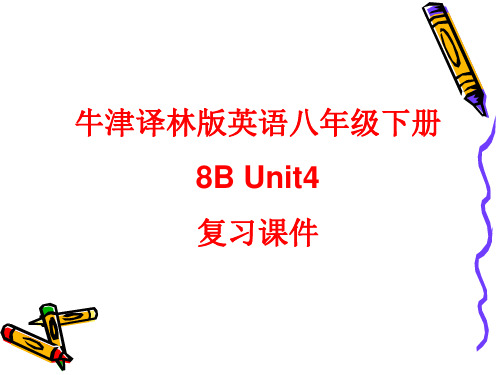
类别 中考考点助记
8.success n. 成功→_su_c_c_es_s_fu_l _ (形容词) →s_u_cc_e_s_sf_ul_ly_ (副词) →s_u_c_ce_e_d___ (动词) 9.translate vt.&vi. 翻译→_t_ra_n_s_la_ti_o_n (名词) 词语 10.Canadian adj. 加拿大的 联想 →__C_a_n_a_da__ (加拿大) 11.hidden adj. 隐藏的→_h_i_d_e____ (动词)
(2) --Dad, which do you prefer, tea or coffee?
(3) -- _D_______ is OK.I don’t mind.
(4) A.Both
B.Neither
(5) C.All
D.Either
考查不定代词。both意为“两者都”,作主语时谓语动词用复数; neither意为“两者都不”;all表示“三者或三者以上的人或事物”; either表示“两者中的任一个”,作主语时谓语动词用单数。句意: “爸爸,茶和咖啡你更想要哪种? ”“任意一种都可以。我不介
Jennifer’s.
A.not the same as
B.all the same as
C.worse than
D.difficult to
be different from意为“与……不同”, 与 not the same as同义, 故选A。
考点4 continue vt.&vi.继续
[点拨] continue后可接名词、代词、不定式或 动名词形式作宾语。 [搭配] continue to do/doing sth 继续做某事 to be continued (未完)待续
牛津英语Chapter 4 Numbers Language课件(沈阳牛津八级上)(精选)共33页文

▪
28、知之者不如好之者,好之者不如乐之者。——孔子
▪
29、勇猛、大胆和坚定的决心能够抵得上武器的精良。——达·芬奇
——叔本华
谢谢!
33
牛津英语Chapter 4 Numbers Language课件(沈阳牛津八级上)(精
选)
36、“不可能”这个字(法语是一个字 ),只 在愚人 的字典 中找得 到。--拿 破仑。 37、不要生气要争气,不要看破要突 破,不 要嫉妒 要欣赏 ,不要 托延要 积极, 不要心 动要行 动。 38、勤奋,机会,乐观是成功的三要 素。(注 意:传 统观念 认为勤 奋和机 会是成 功的要 素,但 是经过 统计学 和成功 人士的 分析得 出,乐 观是成 功的第 三要素 。
39、没有不老的誓言,没有不变的承 诺,踏 上旅途 ,义无 反顾。 40、对时间的价值没有没有深切认识 的人, 决不会 坚韧勤 勉。
▪
26、要使整个人生都过得舒适、愉快,这是不可能的,因为人类必须具备一种能应付逆境的态度。——卢梭
▪
27、只有把抱怨环境的心情,化为上进的力量,才是成功的保证。——罗曼·罗兰
牛津沈阳版英语八下《Chapter 4 Some Days;Never a dull mment》ppt课件

First, electricity comes from______________ a power station. Next, it goes into the _____________ thick wires that are buried _____________. under the street.These thick wires are connected to __________ the meter in our flat. Then it goes into ______________ the thin wires which are connected to the meter. Finally, it comes into___________ our flats.
Benny.
Listen to paragraph 1-3.
Read paragraph 14---21.
Tell if the following statements are true or fat first Benny thought his trick had been
how electricity comes into our classroom?
5 wire 6 light bulb
4 meter
2 street 1 power station 3cable
Read paragraph 9---13 and rearrange(排 序) these sentences (1) It goes into the thin wires which are connected . to the meter.
新版牛津译林8BU4知识点
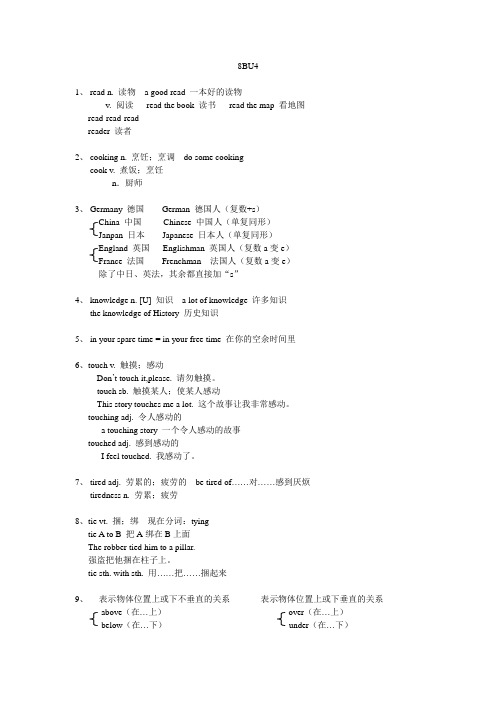
8BU41、read n. 读物 a good read 一本好的读物v. 阅读read the book 读书read the map 看地图read-read-readreader 读者2、cooking n. 烹饪;烹调do some cookingcook v. 煮饭;烹饪n.厨师3、Germany 德国German 德国人(复数+s)China 中国Chinese 中国人(单复同形)Janpan 日本Japanese 日本人(单复同形)England 英国Englishman 英国人(复数a变e)France 法国Frenchman 法国人(复数a变e)除了中日、英法,其余都直接加“s”4、knowledge n. [U] 知识 a lot of knowledge 许多知识the knowledge of History 历史知识5、in your spare time = in your free time 在你的空余时间里6、touch v. 触摸;感动Don’t touch it,please. 请勿触摸。
touch sb. 触摸某人;使某人感动This story touches me a lot. 这个故事让我非常感动。
touching adj. 令人感动的a touching story 一个令人感动的故事touched adj. 感到感动的I feel touched. 我感动了。
7、tired adj. 劳累的;疲劳的be tired of……对……感到厌烦tiredness n. 劳累;疲劳8、tie vt. 捆;绑现在分词:tyingtie A to B 把A绑在B上面The robber tied him to a pillar.强盗把他捆在柱子上。
tie sth. with sth. 用……把……捆起来9、表示物体位置上或下不垂直的关系表示物体位置上或下垂直的关系above(在…上)over(在…上)below(在…下)under(在…下)There is a bridge over the river.在河上有一座桥。
牛津译林8BU4教案.doc

8B Unit 4-、词组和短语序号English Chinese1 be the host of a charity show 做慈善演出的主持人2 sleep less during the day 白天少睡点3 practice a lot 多练习4 advertise on the Internet 在英特网上登广告5 give out (leaflets) 散发(传单)6 organize a charity show 组织一次慈善演出7 Project Green Hope 绿色希望工程8 Project Hope 希望工程9 Save China^s Tigers 拯救中国虎10 Spring Bud Project 春蕾计划11 raise money for sb. 为某人(某组织)筹款/募捐donate sth.(money) to sb. 捐某物(钱)给某人12 return to school = come back to school 冋到学校13 help(sb.) with sth. = help (sb.) do sth. 帮忙(某人)做某事14 hard work 艰苦的工作work hard 努力工作(学习)15 start working on the show 开始演出排练16 at the right time 在适当的时候17 at the same time 在同时18 in the beginning = at first 在开始;起初in the end = at last = finally 在末尾;最后19 became a little bit easier 变得容易一点20 keep asking myself (keep doing sth.) 一直问我口己(一直做某事)21 speak loudly 大声地说话22 make a lot of noise 发出很多噪咅23 have/get a lot of support from localbusinesses得到当地金业的大力支持24 help people in need 帮助需要的人25 have/hold a meeting 开一个会have/hold a charity show 举办一次慈善演出26 make money by selling goods and services 通过卖物品和提供服务來挣钱27 choose sb. to do sth. 选择某人來做某事28 make your voice sound louder 使你的声咅听起來更大些29 be interested in 对……感兴趣(延)become interested in 对……产牛了兴趣(短)30 hang in front of the stage 挂在舞台前面31 want the show to be a success 想要这次演出取得成功32 invite me to lunch 邀请我吃午餐33 set up (the stage) 搭建(舞台)34 make a decision / make some decisions 做出决定decide to do sth. = make a decision to do sth. 决定做某事35 volunteer to do sth. 志愿做某事36 pay attention to sth. 注意某物37 wish you [a happy holiday] 希望你(度过)一个快乐的假期wish you [good luck] 希望你(有)好运38 can't wait for sth. = can" wait to do sth. 迫不急待做某事39 thank sb. for (doing) sth. 因为(做)某事而感谢某人40 learn to read and write 学会读书和写字41 go to work instead of going to school 去上班来代替上学42 make this show possible 使这次演出成为可能43 do another show next year 明年再举行一次演出44 clap and shout excitedly 激动地鼓掌和大叫二、重点句了及句型:1.1wish I could be the host.(虚拟语气)我希望可以成为主持人。
牛津沈阳版英语八下《Chapter 4 Some Days;Never a dull moment》
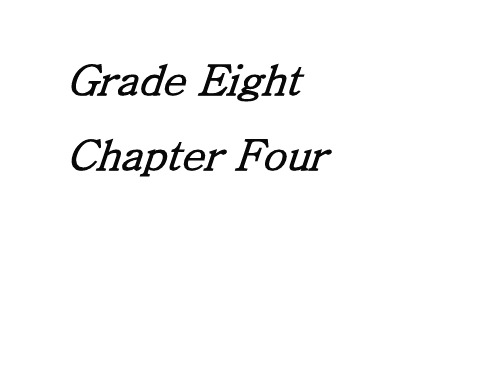
successful.
2.( T ) Daisy bought packets of electricity for Benny when she returned from the shop. 3.( T ) The chemicals inside the batteries produce electricity.
Read paragraph 9---13 and rearrange(排 序) these sentences (1) It goes into the thin wires which are connected . to the meter.
(2) Electricity comes from a power station. (3) It goes into the thick wires that are buried under the street. These thick wires are connected to the meter in our flat. (4) It comes into our flats.
Choose which one is right: A. (1), (3),(2),(4) B. (4), (2),(3),(1) C. (2),(3),(1),(4)
First, electricity comes from______________ a power station. Next, it goes into the _____________ thick wires that are buried _____________. under the street.These thick wires are connected to __________ the meter in our flat. Then it goes into ______________ the thin wires which are connected to the meter. Finally, it comes into___________ our flats.
(精校版)牛津初中英语8Bunit1—unit6知识点归纳

(直打版)牛津初中英语8Bunit1—unit6知识点归纳(word版可编辑修改)编辑整理:尊敬的读者朋友们:这里是精品文档编辑中心,本文档内容是由我和我的同事精心编辑整理后发布的,发布之前我们对文中内容进行仔细校对,但是难免会有疏漏的地方,但是任然希望((直打版)牛津初中英语8Bunit1—unit6知识点归纳(word版可编辑修改))的内容能够给您的工作和学习带来便利。
同时也真诚的希望收到您的建议和反馈,这将是我们进步的源泉,前进的动力。
本文可编辑可修改,如果觉得对您有帮助请收藏以便随时查阅,最后祝您生活愉快业绩进步,以下为(直打版)牛津初中英语8Bunit1—unit6知识点归纳(word版可编辑修改)的全部内容。
牛津初中英语8B unit1—unit6 知识点归纳牛津初中英语8B unit1—unit6 知识点归纳Unit1一.【精选词汇】 ㈠重点短语 1. the changes to Sunshine Town阳光镇的变化→the changes to… …的变化 (p8) <知识链接〉change n.变化,常用复数changes. e.g。
Great changes have taken place since 1995. 2. in the southern part of town →in the southern part of…在…的南部→south→southern <知识链接〉east东部→eastern东部的, west →western,north →northern 3. in the past在过去→at present现在→in the future未来;将来,注意这些短语中的介词和冠词. 4。
turn the place into a park →turn…into…把…变成… 〈知识链接〉①Heat turns water into vapor。
牛津初中英语8B Unit4.

牛津初中英语8B Unit4Grammar语法课应注重让学生理解时态和语态特点,引导学生根据句子的意思去判断而不是一味的死记硬背。
建议精讲以练为主在练中找问题。
Objectives: l.To understand the purpose of using connectives of reason2.To use “because” to give a reason for something3.To use “because of ” to give a reason for something4.To show results with “so”5.To use “hope” and “wish” correctly四会单词ground, decision, poster, flood in the future词组to be a success, make a lot of noise, lots of practice, become interested in, raise money for Project Hope make some decisions hold a show句型They all become very interested in charity shows .They don’t have enough money to buy books.We plan to hold the show indoors because it might rain.The fans made a lot of noise because of the pop stars.三会:单词indoor(adj) indoors(adv)notepaper attention pay attention词组be broken in the future doesn’t seem possibleTeaching procedures1.Explain that when we ask for reasons, we use “why”. When we give reasons,we can use “because”.2.Tell students to turn to the reading passage on page 60. Ask them to underlinethe sentences that contain the word “because”, ask “why did Ricky help with the charity show?”(Because he wanted to raise mone y for Project Green Hope.), and other questions.3. Ask students to read out one example from the grammar table at the top of P64.4. Questions about the charity show.Grammar BSum up: Because +clause(reason)1. Tell them that we can also use “because of” to give a reason for something. When we use “because of”, it is followed by a noun , a pronoun or a noun phrase.2. Tell them to read the words above the speech bubbles in Part B1. Tell them that the first part says what happened, and the second part is the reason. Ask them to write sentences using “because of”.3. Ask students to read out their answers to Nos2---4 and put them into Chinese.4. Explain the context of Part B2. They are looking at pictures of a flood. Tell them that Amy is answering Shirley’s questions about it. Ensure all the students know the meaning of “flood”.5. Answer the questions using “because” or “because of”.6. Select two students to play the roles of Shirley and Amy, ask and answer in pairs.Sum up: because of + a noun, a pronoun or a noun phrase(reason)Grammar C1. Tell the students that we can use “so” to introduce a result. Read out the two examples and explain the first part is a fact, and the second part is a result of the fact.2. Give the information in the example sentences using “because”.3. Ask the students to rearrange the words in Part C1 to make sentences. Remind them that the first part of the sentence should be a fact and the second part should be a result. Make sure they understand the two parts and the relations between them.4. Once students have finished, ask them to read out the sentences and put them into Chinese.5. Ask students to read through Kitty’s letter in Part C2 for overall mean ing first. Then ask them to fill in the blanks using “because”, “because of” or “so”. They can work in pairs.Grammar D1 Tell Ss that we use ‘hope’ and ‘wish’ to talk about things or situations that we want to happen.1)To hope is to want something to happen and think that it is possible. We usually use ‘hope’ to talk about the present or the future.2)To wish is to want what is not happening or what did not happen. We usually use ‘wish’ to talk about the past or the present.Explain the context of the exercise. The students are having a meeting to talk about their charity show. However, everyone is talking or thinking about different things. Ask Ss to complete the exercise using the correct forms of ‘hope’ and ‘wish’.Ask volunteers to read out their answers. Tell Ss to check their own work.Because + sentence because of +phrase/noun/pronounSo + resultBecause/ because of +reasonWe can’t use “because” and “so” at the same time.‘hope’& ‘wish’hope + that/ to do 表示很希望发生或可能性较大wish + that 表示发生的可能性较小或与现实情况相反wish 还可用于表达祝愿。
- 1、下载文档前请自行甄别文档内容的完整性,平台不提供额外的编辑、内容补充、找答案等附加服务。
- 2、"仅部分预览"的文档,不可在线预览部分如存在完整性等问题,可反馈申请退款(可完整预览的文档不适用该条件!)。
- 3、如文档侵犯您的权益,请联系客服反馈,我们会尽快为您处理(人工客服工作时间:9:00-18:30)。
东北育才双语学校初二英语第八次周练试卷考试内容:8B Chapter4-6I 选择填空(1*20=20)1. I didn’t like walking. ---_________________A So did I.B Neither did I.C So do I.D Neither do I.2. All the students are busy _________ the poem.A writeB wroteC to writeD writing3. Why not go and listen to the music? ---____________A OKB YesC Good ideaD That’s all right.4. You’ll hear the bell 20 miles ______ from my house.A awayB farC ofD about5. One half of the wall _________ paper.A is covering withB are covering withC are covered byD is covered by6. There is __________ juice in the bottle.A too manyB too muchC much tooD many too7. We need _____________ students to help.A two hundredB two hundreds ofC hundred ofD two hundreds8 .It’s so warm here. Why not _______ your coat?A take awayB put onC put downD take off9. It was time _____________.A get clean upB to get cleaning upC get cleaned upD to get cleaned up10. That’s ____________ I want to say.A whereB whenC whatD how11. Fortunately we had a map,without ________ we would have got lost.A whichB itC thatD what12. She told me the things and people _________ influenced her.A whichB that C不填 D what13 .He asked me _______________ .A if I will come tomorrowB when did I come backC what I preferredD what the matter is14. She is ______ good teacher that everyone wants to see her.A such aB a suchC a veryD so15. Which is ___________ , gold or life?A preciousB more preciousC the most preciousD much precious16.___________ have you been to England? ________ has he been in America?A How long ,How longB How long, How many timesC How many times , How many timesD How many times, How long17 .Every day, he spent half an hour _________ the room.A cleaningB cleans toC cleanD clean18. People have rice dumplings ___ the Dragon Boat Festival.A celebrateB celebratingC to celebrateD celebrated19. May I go now? ---No, you _________. You _________ stay here.A mustn’t, have toB needn’t, have toC needn’t, mustD needn’t, has to20 .I didn’t find _______ interesting to read.A itB onesC oneD a oneII 完型填空(1*10=10)Nearly everybody enjoys chicken, and the most famous name in chicken is Kentucky Fried Chicken. Mr Sanders, the man who started this ___21___ was not always very rich. At one time, he ___22___ a small gas station next to a highway (公路). Many truck drivers ___23___ there to get gas and take a rest. Mr Sanders realized they were often ___24___, so he began serving sandwiches and coffee. ___25___ the sandwiches he made tasted good, and didn’t ___26___ too much, more and more ___27___ came to eat at his place. ___28___ Mr Sanders began to serve fried chicken. People ___29___ it very much, and his new business grew rapidly. Not long after, however, another highway was ___30___, and many drivers no longer went to Mr Sanders’ r estaurant. So he had to close it. Then he traveled around the country trying to sell his idea of opening fried chicken restaurants. He succeeded. By 1967, there were almost 5000 Kentucky Fried Chicken restaurants. And now, wherever you go in the United States, you will see one. If you li ke chicken, I’m sure; you’ll enjoy eating Kentucky Fried Chicken.21. A. business B. shop C. life D. search22. A. found B. worked C. saw D. owned23. A. passed B. got to C. stopped D. left24. A. late B. hungry C. tired D. sick25. A. Although B. If C. As D. Once26. A. need B. pay C. spend D. cost27. A. passengers B. drivers C. students D. doctors28. A. Then B. So C. But D. For29. A. ate B. liked C. tried D. drank30. A. appeared B. found C. built D. brokenIII 阅读理解AThe idea of summer time (夏令时)started with an American named Benjamin Franklin(1706-1790). He explained how a lot of the money spent on candles used for light (this was before electricity) could be saved if everyone woke up earlier and went to bed earlier. Even though Franklin’s idea had a clear meaning, most people didn’t want to get up earlier than they had to. Who would?It was not until 1970 that an Englishman named William Willet came up with a way to “make”the sun set(日落) late. His idea was to turn clocks forward by 20 minutes on each of the four Sundays in April, for a total of 80 minutes.William’s idea was laughted at, at first. But when World War I started in 1914, many countries decided they had to save energy for the war, and they put William’s idea into use.Summer time has other uses. The more time you spend outside playing, the less time you are spending in front of the computer or the TV. These things also use energy.However, summer time sometimes causes problems. For example, China used it in 1986, but it was stopped in 1991. That was because the temperatures are quite different from North to South and time from East to West.If the people from northwest part of China use summer time, sometimes they have to get up to work when it is not very bright out side. That will cause some trouble for them.Still, most parts of the world do have summer time, and most people look forward to the extra hour of evening light.31. Franklin gave the idea of summer time in order to ____________ .A save moneyB turn clocks backC get up earlierD go to bed earlier32. When was the idea of summer time put into use?A In 1907B In 1914C In 1986D In 199133. If it is 6:00 now on the first Sunday in April, which is Willet’s time according his idea?A5:40 B6:20 C6:40 D7:2034. According to the passage, which of the following is RIGHT?A The idea of summer time started with an Englishman named William willet.B Before 1907, willet came up with a way to “make” the sun go down late.C By using summer time, people could save energy.D The idea of summer time doesn’t make any trouble.35. Why is summer time not used in China now? Because _________ .A people wouldn’t like to get up earlierB the temperatures are the same all the year roundC it is not use to save energy in chinaD the country is largeB“How are you?” is a nice question. It’s a friendly way that people in the USA greet each other. But “How are you” is also a very unusual question. It’s a question that often doesn’t need an answer. The person who asks “How are you” hopes to hear the answer “Fine” isn’t really an answer. They are simply other ways of saying “Hello” or “Hi”.Sometimes people also don’t say exactly what they mean. For example, when someone asks “Do you agree”, the other person might think, “No, I disagree. I think you’re wrong…” but it isn’t very polite to disagree so strongly, so the other person might say “I’m not sure.”it’s a nicer way to say that you don’t agree with someone.People also don’t say exactly what they are thinking when they finish talking with other people. For example, many talks over the phone finish when one person says “I’ve to go now.” Oten, the person who wants to hang up gives an excuse; “someone’s at the door.”“Something is burning on the stove.” Te excuses might be real, or not. Perhaps the person who wants to hangup simply doesn’t want to talk any more, but it isn’t polite to say that. The excuse is more polite, and it doesn’t hurt the other person.Whether they are greeting each other, talking about an idea, or finishing a talk, people don’t say exactly what they are thinking. It’s an important way that people try to be nice to each other, and it is part of the game of language.36. When a person in America asks “How are you?” he or she wants to hear “____________”A How are you?B HelloC I don’t now.D Fine.37. When a person disagree with someone, it is polite to say “___________”A You are wrong.B I’m not sure.C I’m sure I disagree.D No, I disagree.38. A polite way to finish a talk is to say “___________”A You have to go now.B I want to hang up.C I have to go now.D I don’t want to talk any more.39. When a person says “I’ve to go now. Someone’s at the door.” the person may be _____.A giving an excuseB hurting someone’s feelingC illD asking you a question40. The rule of the game of language is probably ______.A Always say what you mean.B Don’t disagree with people.C Be polite.D Never say exactly what you are thinking.CIt’s not easy to become an astronaut. Out of 20000 people who want to do it, only 20 of these become astronauts.Do you have the qualifications (资格) and experience to become an astronaut? Shuttle captains (机长) must already have 1000 hours’experience of flying planes. If you aren’t a pilot, but want to be part of the team, you must already be a specialist(专家). You must be doctor(博士) of science or math. You have probably already done research. You work well in team.The 2-year training program is hard. You must be 1.6-1.9 meters tall. First you must be fit. You must be able to work for long hours without sleep. You have good concentration(专心). Do you have the right character(个性)? Do you get angry when your bicycle has a flat tire(轮胎泄气)? That would not help the team! Astronauts must work calmly and must be ready to do any job in space.If you are clever, qualified(有资格) and experienced, you can always try. You will be away from home for two years. Flights into space are dangerous. You will not make much money. On the other hand, you will have an exciting trip into space and wonderful views. You will always be famous. You’ll always be one of the world’s very few astronauts.41. According to the passage, _________ people can become astronauts.A fewB a lot ofC manyD plenty of42. Which of the following people would not be a good astronaut?A A pilotB A doctor of mathC A scientistD A doctor of history43. From the passage we can know that a good astronaut _________.A works well and stays calmB can do just one jobC sometimes helps people in the teamD sometimes gets angry44. The passage tells us that an astronaut’s job__________.A is hard but safeB is hard but excitingC is very well paidD will soon be forgotten45. What’s the best title for the passage?A Astronauts travel the fastestB People can become astronautsC Being in space is excitingD How to become an astronautIV 情景交际(1*5=5)(E涂AB, F涂AC, G涂AD)A. This was a really wonderful dinner, Ann.B ____46____ . Wuld you like some more coffee, Joe?A No, thanks. ___47_____.B A photograph.A That’s a nice picture. ___48_____.B Well, that’s Laura, my daughter. And that’s her husband, Jack. ___49______.A The little girl must be your granddaughter.B Yes, that’s Rose. ____50___.A What a lovely family!A. She’s six years old.B. She’s a doctor.C. I’m glad you enjoyed it.D. Who are they?E. How old is she? F. What’s that? G. He’s an engineer.V阅读短文, 回答问题。
